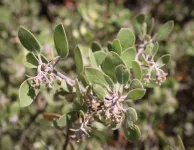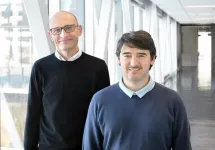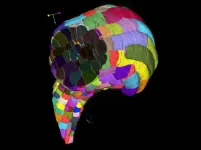(Press-News.org) Our organs age at different rates, and a blood test determining how much they’ve each aged could predict the risk of conditions like lung cancer and heart disease decades later, finds a new study led by University College London (UCL) researchers.
The findings, published in The Lancet Digital Health, show how accelerated ageing in specific organs can predict not only diseases affecting that organ, but diseases across the rest of the body as well.
Lead author Professor Mika Kivimaki (UCL Faculty of Brain Sciences) said: “Our organs function as an integrated system, but they can age at different rates. Ageing in particular organs can contribute to numerous ageing-related diseases, so it’s important for us to take care of all aspects of our health.
“We found that a quick and easy blood test can identify whether a specific organ is ageing faster than expected. In years to come, blood tests like this could play a crucial role in preventing numerous diseases.
“I believe that in the future of healthcare, the prevention of age-related diseases could begin much earlier, prioritising those who would benefit most and tailoring interventions to individual risk profiles.”
The research team, led by scientists from UCL Brain Sciences, the UCL Institute of Healthy Ageing, Stanford University, Inserm, and the University of Helsinki, analysed data from participants from the British Whitehall II study, a longitudinal cohort study that has been running since 1985 and is now led by Professor Kivimaki as Director.
The researchers analysed blood samples collected in the late 1990s from over 6,200 middle-aged adults to determine the biological age of nine organs (heart, blood vessels, liver, immune system, pancreas, kidneys, lungs, intestines, and the brain) and for the entire body. They measured the gap between a person’s chronological (actual) age, and the assessed biological age of each of their organs as determined by markers of ageing specific to that organ, finding that organs often aged at different rates in the same person.
Participants’ health status was tracked for 20 years through national health registries. By the end of the follow-up period, they were aged 65–89, and many had been diagnosed with at least one of the ageing-related diseases investigated in this study.
Follow-up data revealed that accelerated organ ageing predicted the risk of 30 different diseases over the next 20 years in initially healthy people. For instance, a heart that aged more rapidly predicted significantly increased risk of cardiovascular diseases, while people with accelerated lung ageing were predisposed to respiratory infections, chronic obstructive pulmonary disease (COPD), and lung cancer.
Surprisingly, the highest risk of dementia was found in those whose immune system aged faster than usual – not in those whose brains aged more rapidly in midlife. The scientists say this result supports previous findings that people prone to severe infections are also at higher risk for dementia later in life. The finding also suggests that inflammatory processes may play a key role in the development of neurodegenerative diseases.
The researchers found that kidney health was particularly linked to other organs, as people with accelerated kidney ageing were more likely to later develop vascular disease, type 2 diabetes, and liver diseases, while biological ageing of nearly all organs predicted increased risk of kidney disease.
The researchers say that as our organs function in close coordination, accelerated ageing in one organ can impair the function of others, which may explain why people with a rapidly ageing organ were particularly prone to experiencing multiple age-related diseases across different organs.
For many years, blood biomarkers (measurable indicators of health) were measured individually, making the process costly and inefficient, especially when analysing multiple markers. Over the past decade, technological advancements have progressed rapidly, and today, thousands of proteins can be measured simultaneously from a single blood sample.
Blood protein concentrations fluctuate in response to environmental factors, lifestyle, diseases, and medications. As a result, new proteomic (protein-based) analyses offer a valuable window into monitoring the pace of ageing.
The researchers say their findings support a future shift in healthcare toward more personalised and effective disease prevention. With proteomic signatures of organ ageing, risk of age-related diseases can be identified earlier, preventive measures can be targeted more effectively, and interventions can be tailored to each person’s risk profile.
Professor Kivimaki added: “We hope our findings could contribute to new ways of helping people stay healthy for longer as they age. Blood tests may advise whether a person needs to take better care of a particular organ, and potentially provide an early-warning signal that they may be at risk of a particular disease.”
This study was supported by Wellcome, the Medical Research Council, the US National Institutes of Health, and the Research Council of Finland.
UCL
Whitehall II study
UCL Faculty of Brain Sciences
UCL Institute of Healthy Ageing END
Biological organ ages predict disease risk decades in advance
2025-02-26
ELSE PRESS RELEASES FROM THIS DATE:
New manzanita species discovered, already at risk
2025-02-25
A new species of manzanita — a native California shrub famous for its twisted branches and wildfire resilience — has been discovered on the central coast, but its survival is already threatened by urban development that could destroy much of its fragile population.
The discovery is detailed in a new study published in PhytoKeys, where researchers used genetic analysis to confirm the plant as a distinct species. Named Arctostaphylos nipumu to honor the Nipomo Mesa where it was discovered and its indigenous heritage, the species stands out for its shaggy gray bark — ...
Giant ice bulldozers: How ancient glaciers helped life evolve
2025-02-25
New Curtin University research has revealed how massive ancient glaciers acted like giant bulldozers, reshaping Earth’s surface and paving the way for complex life to flourish.
By chemically analysing crystals in ancient rocks, the researchers discovered that as glaciers carved through the landscape, they scraped deep into the Earth’s crust, releasing key minerals that altered ocean chemistry.
This process had a profound impact on our planet’s composition, creating conditions that allowed ...
Toward high electro-optic performance in III-V semiconductors
2025-02-25
(Santa Barbara, Calif.) — From integrated photonics to quantum information science, the ability to control light with electric fields — a phenomenon known as the electro-optic effect — supports vital applications such as light modulation and frequency transduction. These components rely on nonlinear optical materials, in which light waves can be manipulated by applying electric fields.
Conventional nonlinear optical materials such as lithium niobate have large electro-optic response but are ...
In mouse embryos, sister cells commit suicide in unison
2025-02-25
UdeM reproductive biologist Greg FitzHarris and his team show for the first time that sister cells can communicate with each other through a bridge that allows them to die in a coordinated way.
Sister cells are a pair of cells that share the same mother cell. In a new study published in Developmental Cell, researchers led by Université de Montréal (UdeM) professor Greg FitzHarris show how the early mouse embryo gets rid of the defective or unneeded cells in pairs.
“Such a mechanism could serve to ensure the elimination of cells with a ...
Automatic cell analysis with the help of artificial intelligence
2025-02-25
Identifying and delineating cell structures in microscopy images is crucial for understanding the complex processes of life. This task is called “segmentation” and it enables a range of applications, such as analysing the reaction of cells to drug treatments, or comparing cell structures in different genotypes. It was already possible to carry out automatic segmentation of those biological structures but the dedicated methods only worked in specific conditions and adapting them to new conditions was costly. An international ...
New study highlights need for better care to prevent lung problems after abdominal surgery
2025-02-25
AURORA, Colo. (Feb. 25, 2025) – A new study, published today in The Lancet Respiratory Medicine, tested whether a set of interventions to keep lungs expanded before, during, and after abdominal surgery could lower the risk of serious breathing problems in patients compared to the usual care at 17 academic hospitals in the U.S. The research has determined that these interventions for open abdominal surgery do not result in less severe breathing problems as compared to the usual care in those hospitals.
Adult abdominal surgery patient enrollees were either given a lung expansion set of interventions or the typical care plan to follow at each hospital. ...
Microplastics in ocean linked to disabilities for coastal residents
2025-02-25
EMBARGOED FOR RELEASE UNTIL 4 P.M. ET, TUESDAY, FEBRUARY 25, 2025
Media Contacts:
Renee Tessman, rtessman@aan.com, (612) 928-6137
Natalie Conrad, nconrad@aan.com, (612) 928-6164
Microplastics in ocean linked to disabilities for coastal residents
Mobility, self-care, independent living disability higher in areas with high microplastics
MINNEAPOLIS – Tiny bits of plastic found in the ocean may be tied to a higher risk of disability for people who live in coastal areas with high levels, according to a preliminary study released today, ...
Biophysical Society announced undergraduate poster award competition winners
2025-02-25
ROCKVILLE, MD – The 10 winners of the annual Undergraduate Poster Award Competition (UPAC) were recognized at the 69th Biophysical Society Annual Meeting Awards Ceremony on February 17, 2025. After two rounds of judging, judges from every career level selected these students for their outstanding presentations during the poster competition. Seventy-four students participated in the competition.
The 2025 UPAC winners are:
Adam Gatch, Clemson University, USA – “AΒ42 Accelerates Pathogenic Structural Transformation Within ...
Successful strategies for collaborative species conservation
2025-02-25
How can the loss of species and habitats in agricultural landscapes be stopped? Up to now, measures have mostly been implemented by individual farms. In contrast, agri-environmental measures that are planned across farms at landscape level offer greater potential for creating suitable habitats for different species as a mosaic in the landscape. However, successful landscape level approaches also require cooperation between farms and other stakeholders from local governments, politics and nature conservation. Researchers at the University of Göttingen have therefore identified ...
Immune cells may lead to more Parkinson's cases in men
2025-02-25
LA JOLLA, CA—Scientists at La Jolla Institute for Immunology (LJI) have found a potential new target for treating Parkinson's disease. Their new research reveals how a protein in brain cells may drive Parkinson's onset—and offers a possible explanation for why Parkinson's is much more common in men.
In recent years, LJI scientists have found increasing evidence that autoimmunity plays a role in the onset of Parkinson's disease. Their recent study in The Journal of Clinical Investigation shows that PINK1 appears to mark ...




